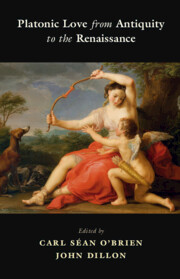Book contents
- Platonic Love from Antiquity to the Renaissance
- Platonic Love from Antiquity to the Renaissance
- Copyright page
- Contents
- Acknowledgements
- Notes on Contributors
- Introduction
- Part I Love in Plato
- Part II Development of Platonic Love in Antiquity
- Part III Love and Metaphysics during the Middle Ages
- Part IV Platonic Love during the Renaissance
- Chapter 12 Human and Divine Love in Marsilio Ficino
- Chapter 13 Marsilio Ficino and Leone Ebreo on Beauty
- Chapter 14 Pico della Mirandola on Platonic Love
- Chapter 15 The Contra-Amorem Tradition in the Renaissance
- Chapter 16 Castiglione and Platonic Love
- Chapter 17 Platonic Love in Renaissance Discussions of Friendship
- Bibliography
- Subject Index
- Index Locorum
Chapter 12 - Human and Divine Love in Marsilio Ficino
from Part IV - Platonic Love during the Renaissance
Published online by Cambridge University Press: 25 August 2022
- Platonic Love from Antiquity to the Renaissance
- Platonic Love from Antiquity to the Renaissance
- Copyright page
- Contents
- Acknowledgements
- Notes on Contributors
- Introduction
- Part I Love in Plato
- Part II Development of Platonic Love in Antiquity
- Part III Love and Metaphysics during the Middle Ages
- Part IV Platonic Love during the Renaissance
- Chapter 12 Human and Divine Love in Marsilio Ficino
- Chapter 13 Marsilio Ficino and Leone Ebreo on Beauty
- Chapter 14 Pico della Mirandola on Platonic Love
- Chapter 15 The Contra-Amorem Tradition in the Renaissance
- Chapter 16 Castiglione and Platonic Love
- Chapter 17 Platonic Love in Renaissance Discussions of Friendship
- Bibliography
- Subject Index
- Index Locorum
Summary
Marsilio Ficino adopted the concept of love from Plato and the Neoplatonists in order to elaborate his philosophy of humanity and divinity. In commenting on Plato’s Symposium, he employed amor/eros for his philosophical theology according to which God and the universe are united: love is that which binds all levels together. As such a mediator and power, it engages humans as a species, as individuals, and in societies. Love is the formula that makes the metaphysical reality intelligible and teachable. Love divides the good from the abject and sets the standard that is attainable and binding for all.
Keywords
- Type
- Chapter
- Information
- Platonic Love from Antiquity to the Renaissance , pp. 201 - 210Publisher: Cambridge University PressPrint publication year: 2022
- 1
- Cited by

